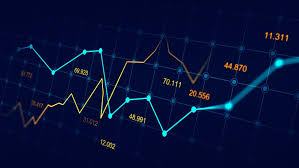Revolutionizing Forex Trading with AI Technology 1714102985
Artificial Intelligence (AI) is redefining numerous industries, and forex trading is no exception. With the integration of AI technologies, traders can analyse vast amounts of data and make more informed decisions. As a prime example of innovation in cryptocurrency trading, ai trading forex minereum.com demonstrates the potential of combining AI with trading platforms. This article...

Artificial Intelligence (AI) is redefining numerous industries, and forex trading is no exception. With the integration of AI technologies, traders can analyse vast amounts of data and make more informed decisions. As a prime example of innovation in cryptocurrency trading, ai trading forex minereum.com demonstrates the potential of combining AI with trading platforms. This article delves into how AI is revolutionizing forex trading by improving accuracy, developing automated strategies, and increasing overall efficiency.
The Rise of AI in Forex Trading
Forex trading is traditionally a fast-paced environment, often requiring traders to make quick decisions based on market fluctuations and trends. In the past, these decisions were made based on human intuition, experience, and analysis. However, with the advent of AI, traders now have access to more sophisticated tools that can process large datasets in real-time, identifying patterns and predicting future movements. This shift is essential as it allows traders to overcome limitations posed by human cognitive biases and emotional decision-making.
How AI Enhances Trading Strategies
AI can significantly enhance trading strategies in several ways:
- Data Analysis: AI algorithms can analyze historical market data, news feeds, economic indicators, and trader behaviors to provide insights that would be nearly impossible for a human to glean alone. With machine learning models, AI continuously improves its predictions by learning from past outcomes.
- Sentiment Analysis: AI can monitor social media platforms, news articles, and other online content to gauge market sentiment. This allows traders to anticipate market movements based on public perception and sentiment.
- Pattern Recognition: AI technologies can recognize complex patterns in price movements, identifying trades that align with profitable strategies. Through deep learning techniques, AI can adapt its models based on new information, ensuring that it remains effective in ever-changing market conditions.
Automated Trading Systems
One of the most significant advantages of AI in forex trading is the ability to develop automated trading systems. These systems can operate continuously without human intervention, executing trades based on predefined criteria. Here are some key benefits of automated trading systems:
- 24/7 Trading: Unlike human traders who require breaks and rest, automated systems can operate around the clock. This capability is crucial in forex, where markets are always open, allowing for the timely execution of trades across different time zones.
- Emotion-Free Trading: Automated systems eliminate emotional decision-making, which often leads to mistakes. By sticking to data-driven strategies, these systems can achieve more consistent results.
- Backtesting: Before deploying a trading strategy in live markets, AI systems can backtest strategies using historical data. This not only helps in refining the strategies but also boosts confidence among traders.
The Role of Machine Learning in Forex Trading

Machine learning (ML), a subset of AI, plays a pivotal role in forex trading. By training algorithms on historical data, traders can develop systems that predict future market behaviors. Some common ML techniques used in forex trading include:
- Regression Analysis: This method helps in predicting future currency prices based on historical data and trends, allowing for informed trading decisions.
- Neural Networks: Inspired by the human brain, neural networks can process complex data inputs to identify patterns that may not be immediately visible through linear analysis.
- Reinforcement Learning: This approach allows AI to learn optimal trading strategies by simulating different market conditions and adjusting its tactics based on success or failure.
Challenges and Considerations
Despite the advantages of AI in forex trading, there are challenges that traders must consider:
- Data Quality: The effectiveness of AI systems heavily relies on the quality and accuracy of the data used for training. Poor data can lead to misleading results and poor trading decisions.
- Market Volatility: Forex markets can be unpredictable, and AI models that perform well in stable conditions may struggle during highly volatile periods.
- Regulatory Concerns: As AI continues to integrate into trading, regulatory bodies are likely to impose new regulations around its usage, requiring traders to stay informed and compliant.
Future of AI in Forex Trading
As technology continues to evolve, the future of AI in forex trading appears promising. Potential developments may include:
- Enhanced Personalization: AI could lead to more personalized trading experiences, where trading tools adapt to individual trader preferences and strategies.
- Collaboration Between AI and Humans: Rather than replacing human traders, AI can act as a supportive tool that enhances human decision-making, combining the strengths of both.
- Integration with Blockchain: The integration of AI and blockchain technology may create transparent and secure trading environments, increasing trust in automated trading systems.
Conclusion
AI has the potential to transform forex trading by providing enhanced data analysis, automated trading solutions, and machine learning algorithms that adapt to market changes. While challenges remain, the benefits of integrating AI into trading strategies are undeniable. As traders continue to leverage these technologies, the forex market will likely become more efficient and accessible than ever before. Keeping abreast of developments in AI technology will be essential for traders looking to stay competitive in this dynamic environment.







 EN
EN